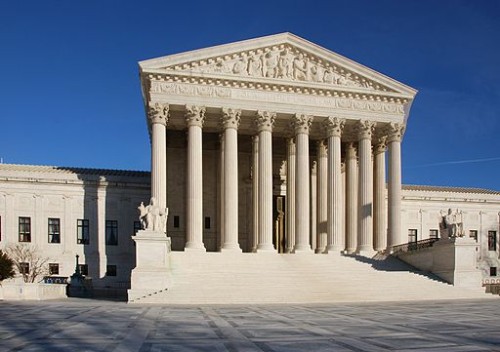UNITED STATES — In an update to a story we reported in May, the Supreme Court of the United States (SCOTUS) did finally rule in the Trinity Lutheran Church of Columbia, Inc. v. Comer case. The decision states that the Missouri Department of Natural Resources grant policy was in violation of the First Amendment.
The state had rejected the church’s application for an improvement grant on the basis of it being a religious institution. However, SCOTUS stated that the church’s services and its improvements were a “public benefit.” Therefore, the state’s denial violated the free exercise clause.

[Jarek Tuszynski (Jarekt), via Wikicommons]
However, as TWH noted in May, “Both the state of Missouri and the church also agreed to go forward with the hearing, because the resulting decision could have a dramatic impact on all religious organizations seeking funding for their non-religious activities and infrastructure.”
As SCOTUS notes, the question presented is “whether the exclusion of churches from an otherwise neutral and secular aid program violates the Free Exercise and Equal Protection Clauses when the state has no valid Free Establishment Clause concern.”
The court’s final decision suggests that religious organizations are not necessarily banned from government grants, like the Missouri funding, simply due to their religious status.
The case demonstrates just how nuanced drawing the line between church and state operations can become.
The majority of religious freedom cases made public involve government operations, funding, or property, as in the Missouri case or in the debates over the new Texas adoption law. Most religious freedom restoration acts and similar legislation are focused on the grey areas resting between the intersections of religious life and public life.
However, SCOTUS has agreed to hear another case that delves into religious freedom held by private individuals expressed through private industry.
June marked the two-year anniversary of the Supreme Court ruling on marriage equality, Obergefell v. Hodges. While many have benefited from the sweeping decision, there has also been steady backlash against the ruling, most of which is religion-based.
One of the most famous, or infamous, cases of backlash occurred in August 2015 when a Kentucky county clerk refused to issue marriage licenses to same-sex couples, citing her religious beliefs. At the time, a U.S. District Court judge dismissed all three lawsuits filed against Davis, and the state eventually changed its policy, taking the clerk’s name off of all marriage documentation. Davis has since returned to work.
However, that is not where the story ends. The case was reopened in May after the couple pushed their appeal. Ermold et al v. Davis will be heard again in the U.S. District Court in eastern Kentucky.
But that particular case, once again, involves a clash between church and state, and to be clear, SCOTUS has not gotten involved.
By contrast, there is a similar case out of Colorado that involves private industry, and SCOTUS has elected to hear this one.
In 2012, cake artist Jack Philips, owner of Masterpiece Cakeshop, refused to do business with same-sex couple Charlie Craig and David Mullins.
After the incident, Craig and Mullins complained to the Colorado Civil Rights Commission. The commission agreed with them, saying that Philips had violated the state’s public accommodation legislation. The law states:
Prohibited discriminatory practices in places of public accommodation must be based on certain protected classes and include these adverse actions: denial of service, terms and conditions, unequal treatment, failure to accommodate and retaliation.
Protected classes for places of public accommodation are: Race, Color, Disability, Sex, Sexual Orientation (including transgender status), National Origin/Ancestry, Creed, Marital Status and Retaliation
The complaint set off a long legal battle during which most of the rulings sided with the couple, and the 2015 marriage equality decision only helped the couple’s arguments.
When in 2014 the Colorado Supreme Court refused to hear the case, bakery owner Philips petitioned SCOTUS. The high court granted the petition, and the case will be reportedly heard in October.
As noted in that petition, the question presented is “whether applying Colorado’s public accommodations law to compel Phillips to create expression that violates his sincerely held religious beliefs about marriage violates the Free Speech or Free Exercise Clauses of the First Amendment.”
Similarly, a Washington florist is appealing to the court system after complaints that she, like Philips, refused to do business with a same-sex couple, citing religious reasons.
In a recent blog post, Americans United has said, “With several related cases filtering through the court system around the country, the high court should now definitively declare that businesses can’t use religion as an excuse to discriminate.” Other civil rights organizations agree: private businesses who provide public accommodations should not be legally allowed to discriminate.
However, as these various cases unfold, there is an important distinction that must be made between those involving private business and those involving public operations. For example, Davis, who refused to do her job, was employed in a government position. Philips, who also refused to do his job, works for himself.
In the cases of the Trinity church and county clerk, the argument is one of separation of church and state. In the cases of the bakery and florist, there are concerns relating to the government’s regulation of private business.
While all revolve around discrimination and the honoring of religious belief, that very distinction will set these cases apart in how the courts will handle them.
Regardless, these various situations provide fertile ground for continued discussions on the negotiation and legislation of religious freedom, discrimination, sincerely-held beliefs, public accommodation, and how we draw the line within a vastly diverse society.
TWH will continue to following the decisions by the court.
The Wild Hunt is not responsible for links to external content.
To join a conversation on this post:
Visit our The Wild Hunt subreddit! Point your favorite browser to https://www.reddit.com/r/The_Wild_Hunt_News/, then click “JOIN”. Make sure to click the bell, too, to be notified of new articles posted to our subreddit.